WORKING IN THE NEIGHBORHOODS
MAPPING IN ROPOLON NEIGHBORHOOD. JULY 2013
After a series of meetings with the local comunity of Ropolon area the neighborhood was studied and some major problems were spotted. The land was mapped in order to identify and register the plots and compose a cadastre. The creation of a cadastre is a key point in the city planning process.
Tras diversos encuentros con la comunidad local del barrio, se realizó un análisis de la zona, mapeando el lugar y reconociendo los principales déficits. Sobre estas bases, esta información, se trabajó posteriormente en asignaturas de proyectos y urbanismo en el CEU, soluciones y planteamientos que fueron presentados en enero de 2014.
También se generó un primer borrador de Documento de Análisis-Diagnóstico, que se pretende continuar con la comunidad local. Se ha podido mapear en detalle una zona, identificando sobre el plano parcelas, pozos, letrinas, cocinas,… Esta base, es la primera referencia gráfica que se tiene en toda la ciudad de la división en propiedades. La continuidad de estos trabajos por la propia comunidad puede generar un aprendizaje, con el potencial de ser replicado en otras zonas de la ciudad, permitiendo que sean los propios habitantes de Makeni quienes puedan elaborar un futuro catastro, con el apoyo técnico de la Universidad.
 Plenary SessionParticipatory session with Ropolon community |  Cartography made by CEU University |  Proposals around RopolonProposals for the growth of Ropolon (made by students of CEU University) |
|---|---|---|
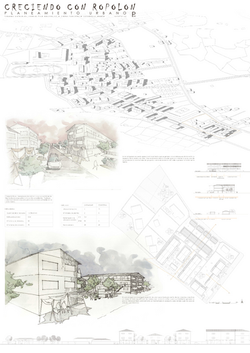 Proposals around RopolonProposals for the growth of Ropolon (made by students of CEU University) |  |  |
 |  | 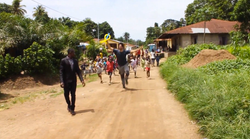 |
NEIGHBORHOOD UPGRADING PROGRAMME ROBUYA VILLAGE. JANUARY 2017
The main activity during the January 2017 trip of CEU University to Makeni has been the starting of an Upgrading Neighbourhood Programme, developed in Robuya village. From a participatory approach, lecturers and students from the University of Makeni and the San Pablo CEU University and technicians of the Makeni City Council, worked with the local community detecting the main priorities of the neighbourhood.
From a first meeting in the Community Center of Robuya, two groups were formed linking villagers, students, lecturers and professionals in three main tasks:
1. Mapping
2. Data collection
3. Survey for detecting priority interventions
A preliminary report was produced during the process, containing the mapping and colleted data.
You can also check the final report on Robuya Village presented to Makeni officials on January 2018 on the link below.
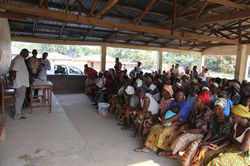 | 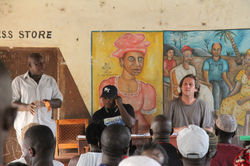 |  |
|---|---|---|
 | 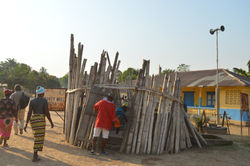 |  |
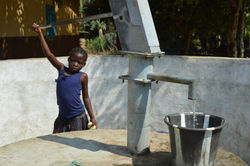 | 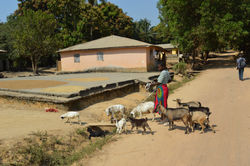 |  |
NEIGHBORHOOD UPGRADING PROGRAMME MASUBA VILLAGE. JANUARY 2018
The work introduced is the continuation of the urban planning process started by San Pablo CEU University (Madrid, Spain), University of Makeni-UNIMAK (Makeni, Sierra Leone) and the Makeni City Council. This process includes three participatory workshops in the city of Makeni (July 2013, January 2014, January 2016 and January 2017) with another activities in January 2018. The last step in the process has included different activities during the January 2018 trip of CEU University. The main one was the continuation of a Neighbourhood Upgrading Programme, in Masuba Neighbourhood. From a participatory approach, lecturers and students from the University of Makeni and San Pablo CEU University with technicians of the Makeni City Council, worked with the local community detecting the main priorities of the neighbourhood. From a first meeting in the Community Center of Masuba, three groups were formed linking dwellers, students, lecturers and professionals in three main tasks (Mapping, Data collection and Survey for detecting priority interventions). The report follows the previous document generated for Robuya village in 2017.
The present document includes a brief summary of the works developed during the fieldwork (two sessions) and the main conclusions obtained. It has been completed later to obtain this Final Report, organized in the following topics:
1. Approach
2. Mapping
3. Data Collection and Quantitative Analysis. Key part of the report, based on 10 habitability topics, that summarizes the main issues in Maasuba neighbourhood
4. Survey
5. Conclusions
6. References
You can take a look at the final report on Masuba presented to Makeni officials on January 2019 on the link below.
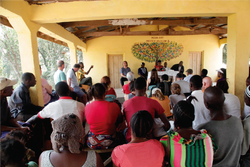 | 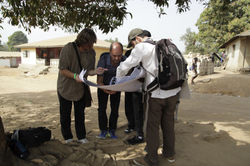 |  |
|---|---|---|
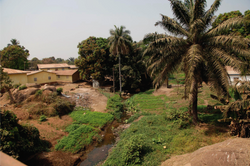 |  | 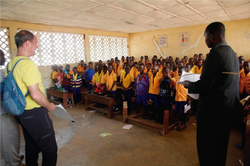 |
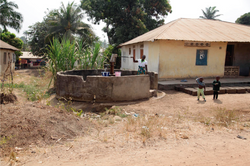 |  |
NEIGHBORHOOD UPGRADING PROGRAMME MAKENKITA VILLAGE. JANUARY 2019
The work is established within the urban planning process that began in 2013 among CEU University, UNIMAK and Makeni City Council.
The interventions in the city have two main priority areas:
-
The existing city
-
The planned or future city
The aim is to create a long term programme working on the existing city that allows to approach different areas of the city of Makeni. The work is carried out together with the local community; professors and students from both CEU University and UNIMAK, and with the support of the Makeni City Council.
-
GOALS
-
Collecting data and developing a technical report from each neighborhood/village. Working on analysis, mapping, collecting data and specific information together with the local population. Useful report for the neighbourhood, the Makeni City Council and UNIMAK
-
Training. Knowledge acquired in the process by the population, the students and all the implied stakeholders.
-
Detecting priorities and funding options. The analysis will define the priority actions and the alternative funding possibilities.
-
TASKS DEVELOPED
The work was focused on Makenkita, but the neighbourhood villages of Bombali-Bana and Katala were also visited with different tasks.
-
First meeting with the local community. Tuesday 29th January 2019. 12 people from different ages were selected in the Makenkita Community (women and men) for working together with the Universities. Three groups were organized, dividing the neighbourhood in two parts.
-
Fieldwork. Two sessions were developed (Tuesday 29th morning and Wednesday 30th in the morning). Mapping, data collection and survey about priorities were done with the very kindness support of the local community.
-
Conclusions. After some working sessions between UNIMAK and San Pablo CEU teams, were working in the information obtained.
-
Final meeting with the local community. Thursday 31st January 2019. In a Final meeting a dinner was organize to conclude the experience. Villagers, students and lecturers shared a nice time with the food cocked by women of Makenkita, with what was bought in the Makeni market with CEU funding.
-
Action founded. Based on the Survey and the works done, the last step was to define a small action fo be founded by CEU University (800 euros). According to what was previoulsy detected, the key project to develope was the construction of a community center in Makenkita village. The area was selected and the villagers started making mud bricks.
-
Final report. With all the iformation, is developed a Final report (this document) that will be presented in the next January 2020 trip
-
Evaluation and checking the task founded. The January 2020 trip will serve for monitoring the experience and for starting with another neighbourhood/village
The Neighbourhood Upgrading Programme tries to give useful information of the areas analyzed, for decision makers, researchers, students, teachers and other interested
people in the field of Habitability. Althougt the documentation generated is broad, technical and participative, is not possible to include the level of analysis that some of the
topics needs. Also, we must apologize for the mistakes and forgotten issues.
You can take a look at the final report on Makenkita Village presented to Makeni officials on January 2020 on the link below.
 |  |  |
|---|---|---|
 |  |  |
 | 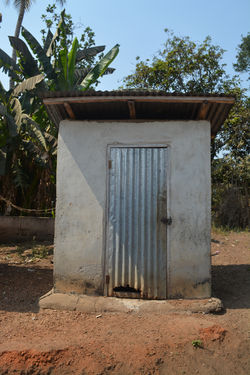 |  |
 |  |  |
 |  |  |
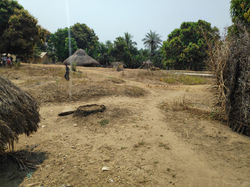 |  |  |
